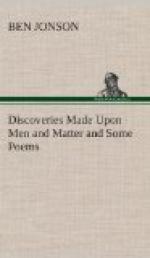It pleased your lordship of late to ask my opinion touching the education of your sons, and especially to the advancement of their studies. To which, though I returned somewhat for the present, which rather manifested a will in me than gave any just resolution to the thing propounded, I have upon better cogitation called those aids about me, both of mind and memory, which shall venture my thoughts clearer, if not fuller, to your lordship’s demand. I confess, my lord, they will seem but petty and minute things I shall offer to you, being writ for children, and of them. But studies have their infancy as well as creatures. We see in men even the strongest compositions had their beginnings from milk and the cradle; and the wisest tarried sometimes about apting their mouths to letters and syllables. In their education, therefore, the care must be the greater had of their beginnings, to know, examine, and weigh their natures; which, though they be proner in some children to some disciplines, yet are they naturally prompt to taste all by degrees, and with change. For change is a kind of refreshing in studies, and infuseth knowledge by way of recreation. Thence the school itself is called a play or game, and all letters are so best taught to scholars. They should not be affrighted or deterred in their entry, but drawn on with exercise and emulation. A youth should not be made to hate study before he know the causes to love it, or taste the bitterness before the sweet; but called on and allured, entreated and praised—yea, when he deserves it not. For which cause I wish them sent to the best school, and a public, which I think the best. Your lordship, I fear, hardly hears of that, as willing to breed them in your eye and at home, and doubting their manners may be corrupted abroad. They are in more danger in your own family, among ill servants (allowing they be safe in their schoolmaster), than amongst a thousand boys, however immodest. Would we did not spoil our own children, and overthrow their manners ourselves by too much indulgence! To breed them at home is to breed them in a shade, whereas in a school they have the light and heat of the sun. They are used and accustomed to things and men. When they come forth into the common-wealth, they find nothing new, or to seek. They have made their friendships and aids, some to last their age. They hear what is commanded to others as well as themselves; much approved, much corrected; all which they bring to their own store and use, and learn as much as they hear. Eloquence would be but a poor thing if we should only converse with singulars, speak but man and man together. Therefore I like no private breeding. I would send them where their industry should be daily increased by praise, and that kindled by emulation. It is a good thing to inflame the mind; and though ambition itself be a vice, it is often the cause of great virtue. Give me that wit whom praise excites, glory puts on, or disgrace grieves; he is to be nourished with ambition, pricked forward with honour, checked with reprehension, and never to be suspected of sloth. Though he be given to play, it is a sign of spirit and liveliness, so there be a mean had of their sports and relaxations. And from the rod or ferule I would have them free, as from the menace of them; for it is both deformed and servile.




